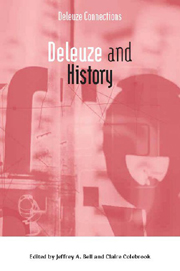Book contents
- Frontmatter
- Contents
- Introduction
- 1 Events, Becoming and History
- 2 Of the Rise and Progress of Philosophical Concepts: Deleuze's Humean Historiography
- 3 Theory of Delay in Balibar, Freud and Deleuze: Décalage, Nachträglichkeit, Retard
- 4 Geohistory and Hydro-Bio-Politics
- 5 The Thought of History in Benjamin and Deleuze
- 6 The Cannibal Within: White Men and the Embodiment of Evolutionary Time
- 7 Ageing, Perpetual Perishing and the Event as Pure Novelty: Péguy, Whitehead and Deleuze on Time and History
- 8 Cinema, Chronos/Cronos: Becoming an Accomplice to the Impasse of History
- 9 Deleuze's Untimely: Uses and Abuses in the Appropriation of Nietzsche
- 10 Is Anti-Oedipus a May '68 book?
- 11 Molar Entities and Molecular Populations in Human History
- Notes on Contributors
- Index
Introduction
Published online by Cambridge University Press: 12 September 2012
- Frontmatter
- Contents
- Introduction
- 1 Events, Becoming and History
- 2 Of the Rise and Progress of Philosophical Concepts: Deleuze's Humean Historiography
- 3 Theory of Delay in Balibar, Freud and Deleuze: Décalage, Nachträglichkeit, Retard
- 4 Geohistory and Hydro-Bio-Politics
- 5 The Thought of History in Benjamin and Deleuze
- 6 The Cannibal Within: White Men and the Embodiment of Evolutionary Time
- 7 Ageing, Perpetual Perishing and the Event as Pure Novelty: Péguy, Whitehead and Deleuze on Time and History
- 8 Cinema, Chronos/Cronos: Becoming an Accomplice to the Impasse of History
- 9 Deleuze's Untimely: Uses and Abuses in the Appropriation of Nietzsche
- 10 Is Anti-Oedipus a May '68 book?
- 11 Molar Entities and Molecular Populations in Human History
- Notes on Contributors
- Index
Summary
Post-structuralism, Postmodernism and Historicism
Perhaps no writer of the twentieth century has done more to intensify the experience of time as Gilles Deleuze. Drawing on the philosophy of Henri Bergson, who had already insisted that the human intellect tends to spatialise time in order to make its efficient and ready way in the world (Bergson 1931), Deleuze went even further than Bergson in calling for a thought of time in its pure state: an intuition of duration that would not impose a uniform clock time on the diverse fluxions of this creative universe. As I will argue in the conclusion of this chapter, it was Deleuze's argument in favour of intensive quantities – against Bergson's rejection of this notion in Time and Free Will (1910) – that led the way for Deleuze and Guattari to posit a human history beyond humanity: that is, Deleuze and Guattari produce a ‘deep’ history that accounts for the emergence of the human according to man's capacity to reduce all intensities to calculable quantities; this reaches its zenith in capitalism, but can also be overcome in capitalism through death. Death, for Deleuze and Guattari, will be the human being's capacity to experience the annihilation of all its coded, historicised and all too human quantities. Man, for Deleuze and Guattari, is produced in history – in narrated, managed, political and epochal time – as an animal who organises matters according to manageable quantities; time in its pure state is intuited, and becomes revolutionary, when intensities are experienced as having their own duration.
- Type
- Chapter
- Information
- Deleuze and History , pp. 1 - 32Publisher: Edinburgh University PressPrint publication year: 2009

